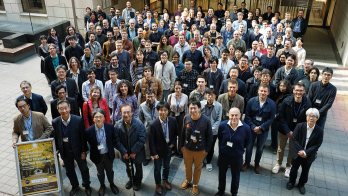At the end of November, European funding agencies for astroparticle physics launched a new sustainable entity, the Astroparticle Physics European Consortium (APPEC). This will build on the successful work of the European-funded network, the AStroParticle European Research Area (ASPERA).
Over the past six years, ASPERA has brought together funding agencies and the physics community to set up European co-ordination for astroparticle physics. It has developed common R&D calls and created closer relationships to industry and other research fields. Above all, ASPERA has developed a European strategy for astroparticle physics to prioritize the large infrastructures needed to solve universal mysteries in concerning, for example, neutrinos, gravitational waves, dark matter and dark energy.
APPEC now plans to develop a European common action plan to fund the upcoming large astroparticle-physics infrastructures as defined in ASPERA’s road map. Ten countries have already joined the new APPEC consortium, with nine others following the accession process. APPEC’s activities will be organized through three functional centres, located at DESY, the Astronomy, Particle Physics and Cosmology laboratory of the French CNRS/CEA, and the INFN’s Gran Sasso National Laboratory. Stavros Katsanevas of CNRS has been elected as chair of APPEC and Thomas Berghoefer of DESY as general secretary.
• APPEC is the Astroparticle Physics European Consortium. It currently comprises 10 countries represented by their Ministries, funding agencies or their designated institution: Belgium (FWO), Croatia (HRZZ), France (CEA, CNRS), Germany (DESY), Ireland (RIA), Italy (INFN), The Netherlands (FOM), Poland (NCN), Romania (IFIN) and the UK (STFC).








